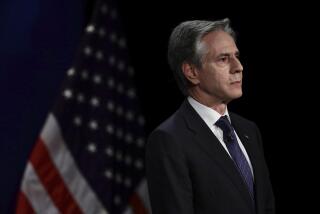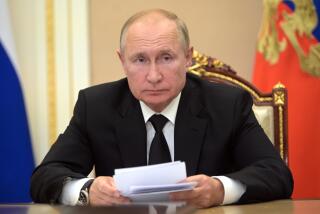Closing a Bridge to Democracy
MOSCOW — MOSCOW -- During her year in the Peace Corps, Laura Geller lived in a typical Russian apartment, enjoyed running a children’s English club, made many friends, destroyed preconceptions about Americans -- and ultimately got kicked out of the country.
The decision by authorities last summer not to renew visas for Geller and 29 other volunteers was the beginning of the end for the Peace Corps here, after a decade of work by hundreds of volunteers to build cross-cultural bridges and help Russians adjust to a globalized market economy.
“I think I broke a lot of stereotypes,” said Geller, 23, who now lives in Youngstown, Ohio. “People don’t understand us. They think we’re ‘loudmouthed Americans,’ we have money falling out of our pockets, we don’t care about anybody.... I’d have people say, ‘We thought all Americans are fat, but you’re not fat.’ Or, ‘Aren’t you rich?’ ”
Halfway through her planned tour at a specialized foreign language school in Penza, 360 miles southeast of Moscow, Geller got word that she had five days to pack up and leave Russia.
“It was such a shock,” she recalled. “At the train station, when I left, was the hardest and the saddest. Everybody I knew came.”
The expulsion of the Peace Corps from Russia, announced last month, fits into a pattern of growing pressure against foreign groups that promote democratic values. Volunteers taught business skills and English, both useful in the nation’s transition from communism.
Moscow recently banned the Organization for Security and Cooperation in Europe from continuing its work in Chechnya, where the group had been monitoring human rights abuses and working toward peaceful settlement of a conflict between Russian forces and separatist rebels.
A prominent U.S. labor activist who has lived in Russia since 1989 had her visa revoked Dec. 30 when she arrived back at a Moscow airport after a brief holiday. Authorities gave no explanation for the expulsion of Irene Stevenson, head of the American Center for International Labor Solidarity in Moscow, which trains union organizers and provides legal aid in labor disputes.
The center, which is backed by the AFL-CIO, provided a lawyer last month for air traffic controllers involved in a labor dispute, and Stevenson has spoken publicly about the need for workers to defend their interests.
The summer decision not to extend the visas of so many Peace Corps volunteers -- even as 34 others had their visas renewed -- also was unexplained at the time. A variety of justifications were offered later.
Nikolai P. Patrushev, head of the Federal Security Service, successor to the Soviet-era KGB, implied to Russian media that the Peace Corps harbored spies. Volunteers had “engaged in collecting information about the sociopolitical and economic situation in Russian regions,” he charged.
Some government officials said volunteers weren’t properly trained. Others said that by hosting the Peace Corps, Russia was lumping itself with poverty-stricken countries of Africa, Asia and Latin America.
The Peace Corps was founded by President Kennedy in 1961 to assist impoverished nations primarily in agriculture, health and education and to improve ties between the United States and host countries.
The Russian Foreign Ministry voiced no criticism in declaring an end to the program in the nation. Instead, it thanked the Peace Corps and said Russia faces new challenges.
“Due to the changing economic and social tasks facing our country, we are holding consultations with the American side on how new forms of partnership could be worked out more in line with today’s needs,” said Foreign Ministry spokesman Alexander Yakovenko.
Liliya F. Shevtsova, an analyst with the Carnegie Moscow Center, said she believes backers of President Vladimir V. Putin engineered moves against foreigners with an eye to parliamentary elections late this year and presidential elections in 2004.
Labor activist Stevenson and the Peace Corps “just had the bad luck of being around at the most inappropriate moment, when their heads -- or the heads of someone like them -- were needed,” Shevtsova said. “What happened to them is not an accident. It is a carefully designed tactic of flirting with the traditionalist, hard-line segment of the Russian electorate.”
Though unhappy about Moscow’s moves, Washington “will not allow these relatively minor points to get in the way of a much more important issue -- Iraq,” she predicted, noting that the Bush administration wants Russian support on the U.N. Security Council.
The 27 volunteers still here -- down from a peak of about 200 -- were due to stay until next summer but will leave before then, said Jeffrey Hay, the Peace Corps’ acting director for Russia. Some of those whose visas were renewed have already left. He declined to speculate on why the group is being forced to leave but said that “the allegations that Peace Corps volunteers are involved in intelligence activities are completely groundless.”
The Peace Corps’ record since its 1992 start here should be looked back on as a success, Hay added.
“We’ve had over 700 volunteers. They’ve been in nearly 40 regions. They taught almost 26,000 students,” he noted.
Viktor A. Kremenyuk, deputy director of the USA-Canada Institute, a Moscow think tank, said he believes that kicking out the Peace Corps was meant to balance the pro-Western stance Putin has adopted since the Sept. 11 attacks on the U.S.
But the decision “does more harm to Russia than to the Peace Corps,” he added.
“The fact that the Peace Corps will no longer operate in Russia is not in itself a horrible tragedy,” he said. “But it scares off other people -- businessmen and companies with big money.... It undermines the country’s ratings in the eyes of Western investors.”
*
Alexei V. Kuznetsov of The Times’ Moscow Bureau contributed to this report.
More to Read
Sign up for Essential California
The most important California stories and recommendations in your inbox every morning.
You may occasionally receive promotional content from the Los Angeles Times.










